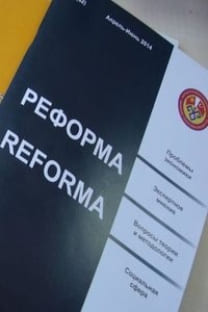TERRORISM AND ORGANIZED CRIME: THREATS TO NATIONAL SECURITY OF CENTRAL ASIA
Especially after the end of the Cold War organized criminal activities have become a major revenue source for terrorist groups worldwide. After the collapse of the Soviet Union, the Central Asian countries faced the problem of organized crime and terrorist activities because of the weakness of the states. As a result in 2000, the five Central Asian countries endorsed a document that would considerably strengthen coordinated efforts to combat the scourge of drug trafficking, organized crime and terrorism. The Central Asian countries have been criticized for adopting a selective approach to implementing Anti Money Laundering and Counter Terrorism legislations. However, in recent years important improvements have been made. Since 2008 all five Central Asian countries have ratified the United Nations Convention against Transnational Organized Crime, the International Convention for Suppression of the Financing of Terrorism, and the United Nations Convention against Corruption. Financial Action task Force removed Uzbekistan and Turkmenistan from the black list. This paper analyzes the relationship between organized crime and terrorism in Central Asia. İt also explores the projected spillover effect on Central Asia after the NATO withdrawal from Afghanistan in 2014.
Anahtar Kelimeler:
Organized Crime, Terrorism, Narco-Terrorism, Money Laundering, Central Asia, Counternarcotic
TERRORISM AND ORGANIZED CRIME: THREATS TO NATIONAL SECURITY OF CENTRAL ASIA
Especially after the end of the Cold War organized criminal activities have become a major revenue source for terrorist groups worldwide. After the collapse of the Soviet Union, the Central Asian countries faced the problem of organized crime and terrorist activities because of the weakness of the states. As a result in 2000, the five Central Asian countries endorsed a document that would considerably strengthen coordinated efforts to combat the scourge of drug trafficking, organized crime and terrorism. The Central Asian countries have been criticized for adopting a selective approach to implementing Anti Money Laundering and Counter Terrorism legislations. However, in recent years important improvements have been made. Since 2008 all five Central Asian countries have ratified the United Nations Convention against Transnational Organized Crime, the International Convention for Suppression of the Financing of Terrorism, and the United Nations Convention against Corruption. Financial Action task Force removed Uzbekistan and Turkmenistan from the black list. This paper analyzes the relationship between organized crime and terrorism in Central Asia. İt also explores the projected spillover effect on Central Asia after the NATO withdrawal from Afghanistan in 2014.
Keywords:
Organized Crime, Terrorism, Narco-Terrorism, Money Laundering, Central Asia, Counternarcotic,
___
- Berdikeeva, S. “Organized Crime in Central Asia: A Threat Assessment” China and Eurasia Forum Quarterly, Volume 7, No. 2 (2009), p. 75-100.
- Cornell, Svante E. “The Narcotics Threat in Greater Central Asia: From Crime-Terror Nexus to State Infiltration?” China and Eurasia Forum Quarterly, Volume 4, No. 1 (2006), p. 37-67.
- “Country Reports on Terrorism 2013 South and Central Asia Overview.” Accessed December 18, 2014. http://www.state.gov/j/ct/rls/crt/2013/224824.htm.
- United Nations Office on Drugs and Crime. “Compendium of Drug Related Statistics. 2009,” March 2010. http://dbroca.uz/pubs/Compendium_2009.pdf.
- ISSN: 1694-5158
- Yayın Aralığı: Yılda 2 Sayı
- Başlangıç: 1999
- Yayıncı: Kırgızistan Türkiye Manas Üniversitesi
Sayıdaki Diğer Makaleler
THE STATE'S ROLE IN THE IMPLEMENTATION OF THE NATIONAL INNOVATION
KIRGIZİSTAN’IN MUHASEBE KÜLTÜRÜ
REMITTANCES AND EMPLOYMENT YOUTH IN KYRGYZSTAN
Kamalbek KARYMSHAKOV, Raziya ABDİEVA, Burulcha SULAİMANOVA
DEVELOPMENT OF RURAL TERRITORIES: CAPACITY BUILDING OF LOCAL COMMUNITIES
TERRORISM AND ORGANIZED CRIME: THREATS TO NATIONAL SECURITY OF CENTRAL ASIA
THE STATE'S ROLE IN THE IMPLEMENTATION OF THE NATIONAL INNOVATION
REGIONAL DIAGNOSIS OF PROBABLE DIRECTIONS OF TECHNOLOGY IMPORT IN THE KYRGYZ REPUBLIC
PİYASA SEMALARINDA HAYEK’İN VE WEBER’İN GÖRÜNTÜSÜ
